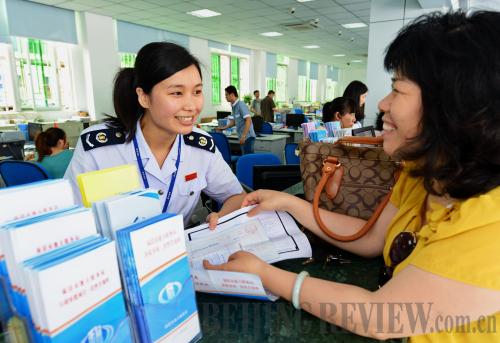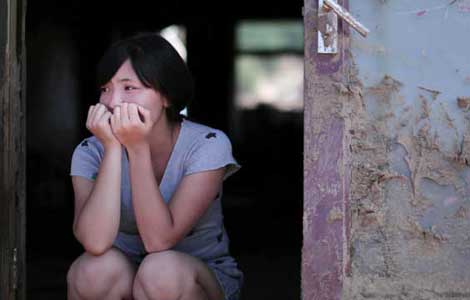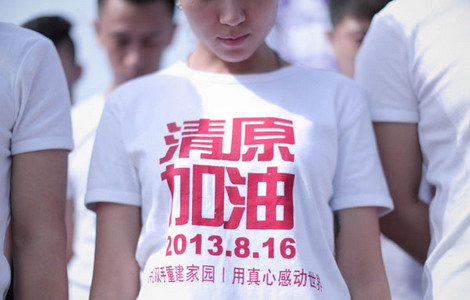China banking on tax reforms to help transform
Updated: 2013-08-26 10:44
(beijingreview.com.cn)
|
||||||||
China is banking on tax reforms to help transform its economy
Reform of the taxation system will be a topic of significant importance at the Third Plenary Session of the 18th Central Committee of the Communist Party of China (CPC) to be held in October, according to some media sources.
|
 |
|
A staff member at a tax office in Fuqing, a city in southeast China's Fujian province, provides service to a local resident. |
The Third Session of the 11th Central Committee of the CPC held 35 years ago inaugurated China's reform and opening up. After more than 30 years, the Chinese economy now faces slower and sluggish growth. The Third Session of the 18th Central Committee of the CPC will further China's reform and opening up in light of current economic circumstances.
When the new cabinet was unveiled in March, it announced three major targets for economic reform in taxation, financial and market systems. Among them, taxation reform is considered top priority.
Wang Jun, head of the State Administration of Taxation, has repeatedly said reforming China's tax laws are vital if China is going to successfully complete transition from a dependence on investment and exports to a more consumer-oriented economy. The change from a business to a value-added tax, a major measure of the reform, began across China on August 1. Shanghai was the initial testing ground for the tax on January 1, 2012, before it was extended to another nine provinces and municipalities, including Beijing and Jiangsu and Anhui provinces.
Tax plays its part
China's auditing authority is now reviewing local government debts nationwide, a move by the Central Government to determine the financial status of local governments in preparation for further tax reforms.
During 35 years of reform and opening up, tax reform has contributed to China's economic development. At the end of the 1970s, when China first adopted its policy of reform and opening up, the Central Government began a system whereby it would delegate taxation powers to lower levels of government and receive little tax income itself, according to Gao Peiyong, Director of the National Academy of Economic Strategy at the Chinese Academy of Social Sciences.
In the early 1990s, China's reform and opening up entered a new stage, and with it came a revision of the tax code. There were three major changes in China's tax reforms of 1993. First, dividing spending from central and local budgets. Spending for national defense, diplomacy and armed forces, national level infrastructure projects, and the repayment of domestic and foreign debt to be paid for by the Central Government.
Local governments would be responsible for provincial and municipal level infrastructure development, research and development of new products by enterprises under local governments, urban construction, as well as spending for local cultural, education and healthcare programs.
Second, dividing the distribution of tax revenues between central and local governments. A dozen taxes, including tariffs, consumption and value-added taxes collected by customs, income taxes and profits paid by enterprises directly under the Central Government would all go to the Central Government.
Some 20 tax items such as business, individual income, urban land use, vehicle and stamp taxes would belong to local governments.
Several other items of tax revenue would be shared by Central and local governments, including the value-added tax, resource taxes and securities tax.
Third, establishing a system of transfer payments. According to the above divisions, 60 percent of tax revenues are designed to belong to the Central Government and 40 percent to local governments, while 60 percent of spending would fall at the hands of local governments and 40 percent at the Central Government. The 20-percent difference goes to the system of transfer payments.
The tax reform of 1993 has also been called the "tax division system" reform by economists. Gao says this tax division system enriches the Central Government's budget, and through transfer payments, China is able to balance the fiscal ability of its different regions in order to improve people's well-being and maintain sustained and rapid growth of the national economy.
Most Viewed
Editor's Picks

|

|

|

|

|

|
Today's Top News
Newly born panda cub at Washington zoo doing fine
Market regulators need to fix loopholes
Singapore PM aims to cement relations
Experts call for details on rumor cases
Joint sea drill shows improved relations
Bo insists he did not abuse power
UN to probe alleged chemical attack
Using stray cats for rat control sparks debate
US Weekly

|

|















